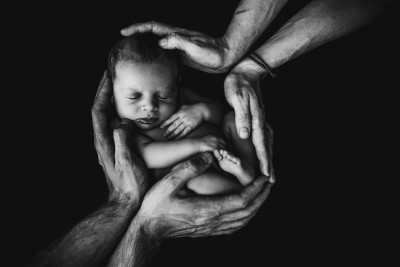A prenatal test shouldn't determine a life

Every year on my sister Marita's birthday, my mom tells the story of her birth. After a night spent wondering if my mom and baby Marita were going to live, my dad placed my sister in my mom's arms and said, "We've been blessed with a little angel."
Marita has a rare genetic disorder — a partial chromosomal deletion and partial trisomy — that caused multiple physical and intellectual disabilities. Because her condition is genetic, shortly after she was born, a doctor advised my parents to pursue prenatal testing for any future children. He said any "problems" would just be "taken care of." My parents — who believe all life is sacred from the moment of conception and were completely in love with their new baby girl — found a new doctor.
The New York Times kicked off the new year with an investigative piece revealing that 85% of prenatal screenings that warn of a rare disorder end up being wrong. Originally designed to screen for conditions like Down syndrome, genetic screening has expanded to encompass all sorts of rare disorders, allowing diagnostic companies to bring in millions of dollars from insurance companies. Many OB/GYNs act as if these tests are routine and their results definitive, failing to mention to their patients that the U.S. Food and Drug Administration does not regulate this type of test at all and that the false-positive rates are extraordinarily high.
Relying on fear, a lack of familiarity with genetic conditions, and the ableist mentality that undergirds the pro-abortion culture, the abortion industry manipulates parents into believing killing their unborn child who has tested positive for an increased risk of genetic abnormality is a merciful act. They argue that by ending the child's life, parents are saving their child from a life of suffering.
Although the root of this problem is a lack of respect for human life, the abortion industry — that always puts profits over people — would not be as capable of exploiting parents without the illusion that the findings of genetic testing companies are "highly accurate."
Abortion businesses see every positive result of genetic screening as a potential client, and the option to abort helps keep prenatal screening tests in demand. With market estimates in the billions, the demand is high — despite the inconclusiveness of the tests. As the genetics testing industry is aware, many women abort without obtaining further testing. Those making genetic screening tests are likely motivated by money, not making the treatment of genetic disorders easier. They are a natural partner of abortion businesses and their eugenic money-making schemes.
Still, it might come as a shock to parents receiving prenatal screenings based on the desire to treat their child in-utero that genetic testing organizations are sponsors of Planned Parenthood events or that C-suite executives like Myriad Genetics Chief Operating Officer Nicole Lambert were volunteers at Planned Parenthood. Perhaps the two industries are more intertwined than it appears.
Across the country, disabilities advocates have fought for the passage of state-level prenatal nondiscrimination acts (PRENDAs), which ban abortions obtained on the basis of a child's inherent characteristic or disability. Thankfully, last year a record high 31 PRENDAs were introduced in different states around the country. As we kick off the 2022 state legislative sessions, 12 of these have already been carried over in 8 different states. Yet sadly, as evidenced by the high abortion rates for babies with chromosomal anomalies, there is much more work to be done to hold back the tide of the abortion industry.
Pro-abortion advocates and businesses actively oppose PRENDAs. Even when these laws are passed, the abortion industry sues to block them from going into effect. At times, they have been successful in thwarting state legislators' efforts to protect unborn babies from discrimination. Hopefully, a life-affirming decision in Dobbs v. Jackson Women's Health Organization will help change that.
My parents knew that the addition or deletion of a chromosome did not determine the worth of a child. They refused to allow the eugenic mentality of the abortion industry to infiltrate their thinking. They rejected the idea that a test should determine which children joined their families and which children were killed. They saw each of their children as a beautiful gift from God and knew each child's life would include joys and sorrows — regardless of genetic makeup. Simply put, I am blessed with parents who decided to love and accept their children unconditionally.
For parents facing a challenging prenatal diagnosis, you are not alone. Abortion is not the answer. Be Not Afraid is an organization that provides real assistance to families who have received a challenging prenatal diagnosis. There you will find hope, support, and other families who — like mine — have been "blessed with a little angel."
Mary Szoch serves as the Director of the Center for Human Dignity at Family Research Council. In this position, Mary researches, writes, and coordinates collaborative efforts with other pro-life advocates on policies surrounding life and human dignity.





















